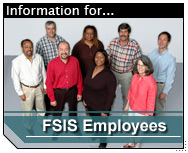 |
|
|
|
|
|
|
 |
|
|
|

|
Nonnie Holliman chuckles when he thinks of how many pounds of meat he has inspected throughout his career at the Food
Safety and Inspection Service. "I'm sure it's way in the millions," Holliman said, as he mentally tried to
calculate the tonnage over more than four decades.
After 42 years with the agency, he's probably right. His eyes have seen millions of pounds of meat. And those same keen
eyes have potentially protected millions of people from foodborne illnesses.
Holliman works as a Consumer Safety Inspector.
In this capacity, he is on the front line of public health. Assigned to a plant, he makes sure the plant is operating
according to federal rules and regulations and complying with its own processes to ensure the safety and wholesomeness of
products that end up on dining room tables across the country.

Since college, protecting America's food supply has been Holliman's calling. A Virginia native, he earned his business
management degree from Central City Business Institute, in Syracuse, N.Y.; a certificate in Food Safety Regulatory
Essentials from Texas A&M University in College Station, Texas; and he studied Theology and Biblical Studies at
Trinity College and University in Newburg, Indiana. He started working for FSIS after a stint in the meat department of
a supermarket. Within 15 days of applying to work at FSIS, he had the job.
Work has evolved over the years
A lot has changed since Holliman began his career on the inspection line in the early 1970s. Some good, he said. And some
even better than he could have predicted. "We are doing a better job and finding problems early," he said.
When Holliman began his career with FSIS in 1970, inspection was mainly organoleptic, meaning it relied on the senses
of smell and touch – or as some like to say – "poke and sniff" to determine the safety of meat.
These days, in addition to organoleptic inspection, the agency is using other scientific approaches to better detect problems
and protect the American public from foodborne illnesses. In fact, the role of the inspector looks nothing like it did
when Holliman stepped foot in his first plant in Virginia, and Holliman is the first to admit that the changes are for
the better because they have led to safer food.
Inspectors make sure that the establishments to which they are assigned are held accountable for producing safe
and wholesome products by verifying that the establishments are complying with rigorous sanitation standards and
implementing systems that control hazards. They do this by observing plant employees, taking microbiological samples,
and examining plant records. One of the striking differences from when Holliman began is the new dynamic
data-analytics system called the Public Health Information System (PHIS).
The system has been developed as part of a state-of-the art effort to collect, consolidate and analyze data. PHIS
makes Holliman's and other inspectors' work more important than ever. Their work is vital to the public health
mission of the agency, and it is because of their commitment that consumers can eat with the assurance that their
food is safe. "I work every day knowing that my family and I will eat the food that we inspect, and I am sure
that I speak for other inspectors in saying that our work matters," he said.
Holliman began work at FSIS around the time that the nation had begun focusing its attention on increasing the
number of Blacks in the workforce and the federal government, in particular. The time also marked the creation of
the Equal Employment Opportunity Act of 1972, designed to ensure fair treatment to all segments of society without
regard to race, religion, color, national origin or sex. FSIS, during the time, he said, had a rigorous recruitment
effort, and he felt a greater sense of inclusion. By all accounts, he was on the way up.
Name baffles agency, but Holliman benefits
In 1974, as part of an effort to diversify the FSIS workforce to appeal to more women, Holliman was invited to
apply for a promotion within the agency; someone mistook his name for a woman's. Without a sophisticated computer
system to identify demographic information, to the eye, Nonnie could be a woman – so the agency thought.
He was invited to apply for a promotion within the agency. The form was sent to him, so he filled it out.
"Why not," he said. After all, he, too, wanted a promotion. He returned the necessary paperwork and
was notified that he was being assigned to a plant in Boston.
When Holliman arrived at the processing plant in Boston, "imagine the looks on the faces of the employees
there when I showed up. They didn't know what to make of me." To accommodate what was thought to be the new
female employee, the plant built a spiffy new bathroom "with a shiny new mirror," he joked. "We all
knew that I wouldn't be using it, but it was ready for the new female employees who started the following year."
Sense of humor is Holliman's secret to success and way to deal with stress
Holliman attributes his success to having a sense of humor. He has years of funny stories in his head. And in a
position that offers a daily dose of stress, he said the best way to deal with that stress is with a smile and good
humor. And then there's the other benefit, he said: "stress gives you lines on your face." At 64 years old,
Holliman has no lines and he is the first to tell you that no one believes he is retirement age.
Now beginning to think seriously about retirement
For nearly 36 years, Holliman has held a number of inspector positions and he still enjoys the work he does,
although he admits that rising at 3:30 a.m., on most mornings along with the 12-hour days he puts in is tiring.
"I have been seriously thinking of retiring next year." If he does, he will then have one job. In
addition to his work at FSIS, he is also pastor of a church in New York, a role he has held for the past 16 years.
 Whether Holliman retires next year or the next 5 years, he said he is proud of the work he does at FSIS. "I serve
on the front line of food safety and I know I make a difference." And if there is one thing that he wishes he
could change, he said, is this: "When I started, I was the only African-American inspector in my plant,
and all this time later, I still am. I want to find a way to encourage more African Americans to work for FSIS.
It's a great place to work."
Whether Holliman retires next year or the next 5 years, he said he is proud of the work he does at FSIS. "I serve
on the front line of food safety and I know I make a difference." And if there is one thing that he wishes he
could change, he said, is this: "When I started, I was the only African-American inspector in my plant,
and all this time later, I still am. I want to find a way to encourage more African Americans to work for FSIS.
It's a great place to work."
|
Last Modified:
July 27, 2012 |
|
|
|
 |
 |

|

|
|

|

|
 |
FSIS Advertisement Rotator

|
|
|
|
 |